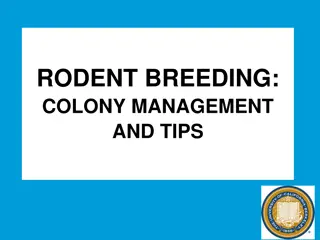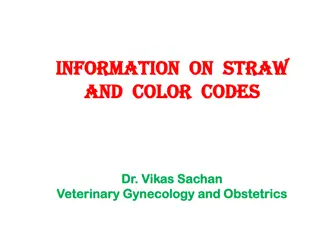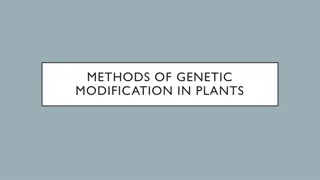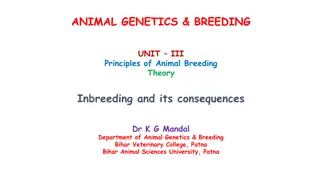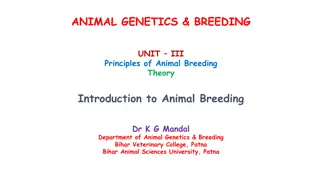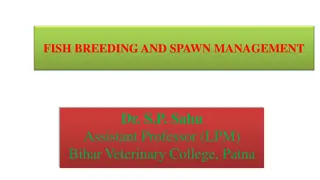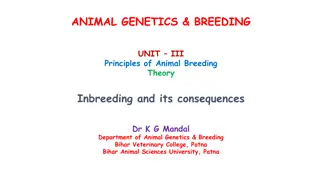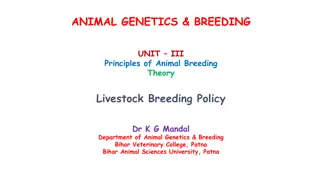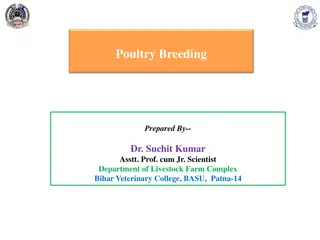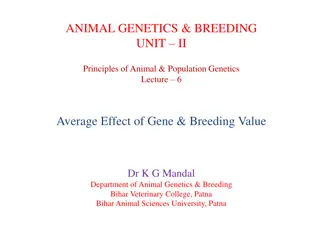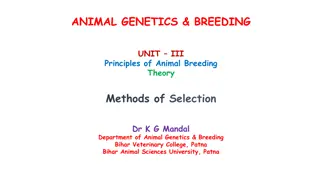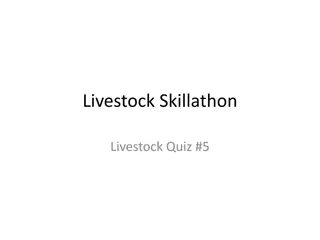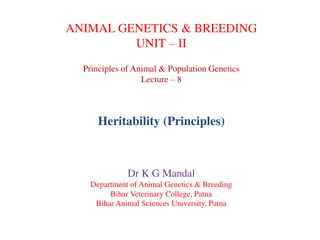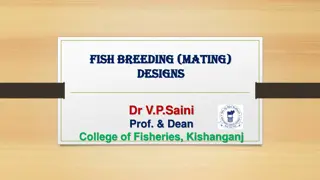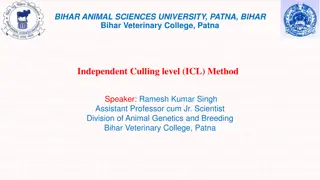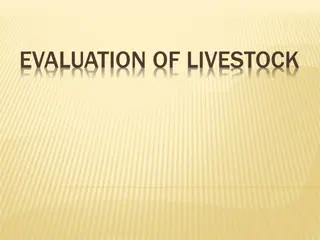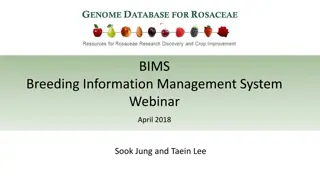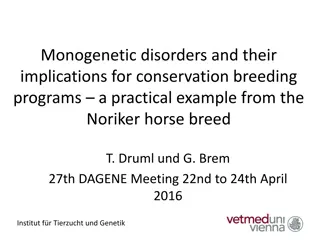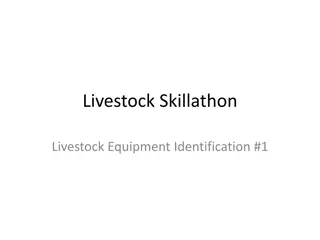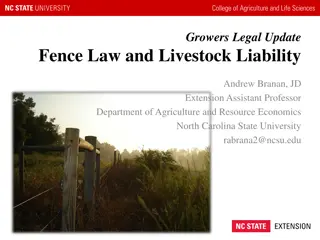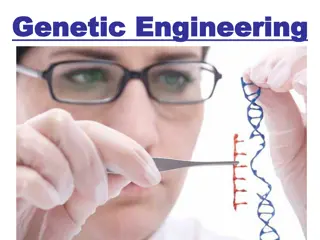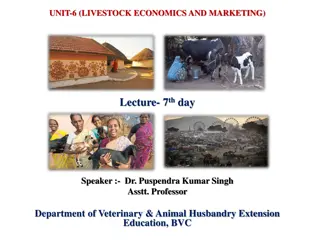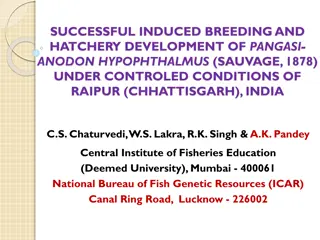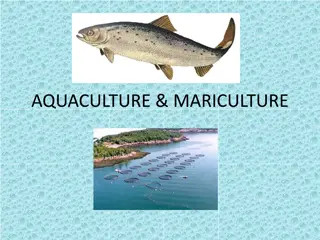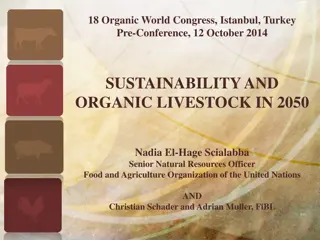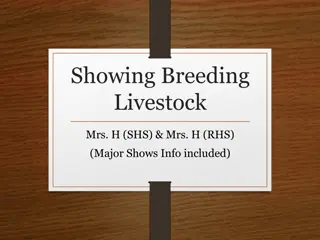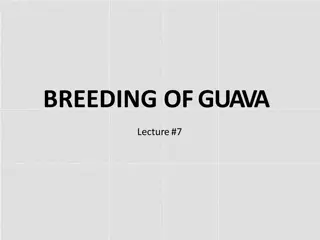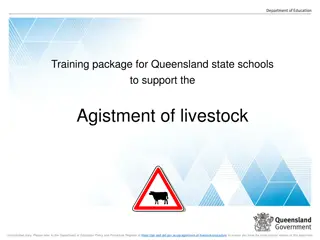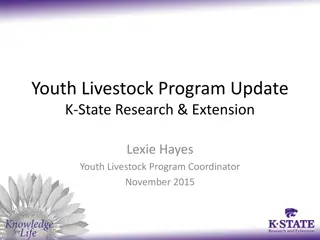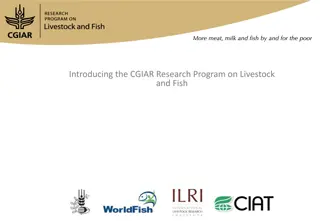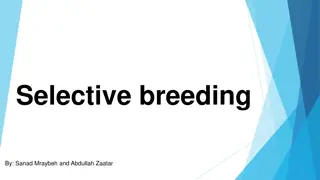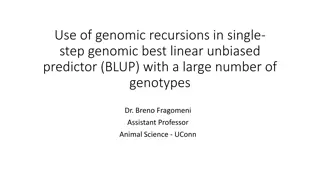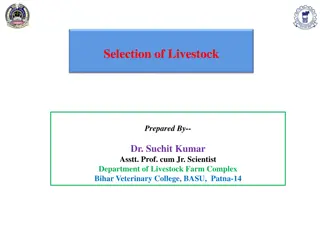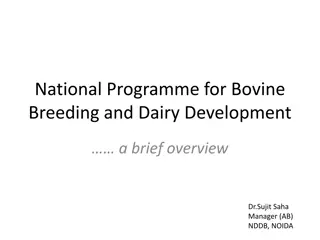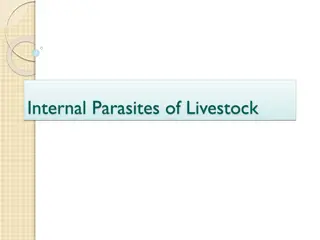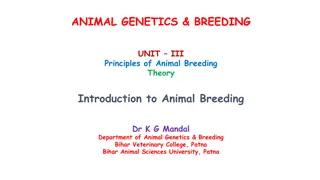Guide to Efficient Rodent Breeding and Colony Management
This comprehensive guide covers essential aspects of rodent breeding, colony management, and tips for successful rodent reproduction. It includes details on weaning, retiring breeders, records management, problem-solving, resources, goals and planning, breeding systems, reproduction processes, genot
4 views • 35 slides
Understanding Breeding Soundness and Straw Identification in Cattle
Learn about the importance of evaluating breeding soundness in bulls, maintaining insemination records, and identifying straws for successful reproduction in cattle. Dr. Vikas Sachan provides valuable insights on bull identity, semen station codes, production dates, and color codes for different bre
1 views • 7 slides
Different Methods of Genetic Modification in Plants
Genetic modification in plants can occur through natural selection, selective breeding, and induced mutations. Natural selection involves breeding compatible species to create offspring with desired traits, while selective breeding is a multi-generational process to breed organisms with specific cha
1 views • 11 slides
Understanding Inbreeding and Its Consequences in Animal Genetics & Breeding
Inbreeding in animal breeding involves mating closely related individuals, resulting in common ancestors within the preceding generations. This practice can have both positive and negative consequences on genetic diversity and health. Various types of inbreeding such as selfing, full-sib mating, and
0 views • 18 slides
Principles of Animal Breeding: Introduction and Historical Perspective
This unit covers the introduction to animal breeding, the application of genetics principles in breeding, historical perspectives including the work of Robert Bakewell, and key events in animal breeding evolution. Topics include breeding systems, importance of animal breeding, and notable figures in
1 views • 12 slides
Fish Breeding and Spawn Management Techniques by Dr. S.P. Sahu
Dr. S.P. Sahu, an Assistant Professor at Bihar Veterinary College in Patna, provides valuable insights into fish breeding and spawn management. The content covers fish seed collection, procurement methods, fry identification, and confined water breeding techniques. Detailed information on Indian maj
2 views • 26 slides
Understanding Inbreeding in Animal Genetics & Breeding
Explore the principles of animal breeding theory focusing on inbreeding and its consequences, including examples like selfing, full-sib mating, and genetic effects. Learn about close breeding, line breeding, and genetic consequences of inbreeding in animal populations. Discover how inbreeding affect
0 views • 13 slides
Livestock Breeding Policy for Genetic Improvement of Cattle and Buffalo in India
India's diverse agro-ecological regions host a wide range of farm animal breeds. The livestock breeding policy aims to enhance the productivity of cattle and buffalo through strategies such as grading up with indigenous superior dairy breeds, crossbreeding with high-yielding exotic breeds, and selec
1 views • 23 slides
Principles and Systems of Poultry Breeding: A Comprehensive Guide
Poultry breeding, led by experts like Dr. Suchit Kumar, involves purposeful selection and mating to improve size, weight, egg production, and meat quality. Environmental factors are crucial, and different breeding systems like inbreeding and line breeding play a role in genetic improvement. Continuo
1 views • 21 slides
Understanding Average Gene Effect and Breeding Value in Animal Genetics
In the field of animal genetics and breeding, it is crucial to comprehend the average effect of genes and breeding value of individuals. Genes are transmitted from parents to offspring through haploid gametes, influencing the genotype and breeding potential. Estimating the average effect of a gene i
5 views • 26 slides
Principles of Animal Breeding Theory and Methods of Selection
Animal breeding involves selecting for desirable traits to improve the overall merit of animals. Methods such as tandem selection and multi-trait selection are used to enhance genetic progress. Economic value, genetic significance, and selection criteria play important roles in the breeding process.
1 views • 16 slides
Livestock Skillathon Quiz Challenge
Test your knowledge of livestock with this interactive quiz. Learn about cattle breeds, common diseases, breeding techniques, and terminology related to raising and caring for livestock. Challenge yourself and expand your understanding of the livestock industry.
0 views • 12 slides
Understanding Heritability in Animal Genetics and Breeding
Heritability is a crucial concept in animal genetics and breeding, indicating the proportion of total phenotypic variance attributed to genetic effects. It helps in predicting breeding values, assessing relationships between individuals, and guiding genetic determinations. Properties of heritability
2 views • 20 slides
Fish Breeding Mating Strategies and Designs for Effective Population Management
Designing mating strategies to maximize the effective breeding population in fish hatcheries is crucial for maintaining genetic diversity and overall fitness. Random mating, simple paired mating, factorial mating, and other breeding designs are discussed to help hatchery managers improve breeding co
4 views • 13 slides
Independent Culling Level (ICL) Method in Animal Breeding
The Independent Culling Level (ICL) method involves selecting multiple traits simultaneously in animal breeding. Breeders set minimum or maximum culling levels for each trait, ensuring continuous improvement in desired characteristics through successive generations. However, challenges exist in dete
0 views • 6 slides
Livestock Evaluation and Cattle Market Priorities
In this visual guide, various aspects of livestock evaluation, focusing on cattle breeding, market priorities, muscle indicators, body parts of a cow, finish indicators, structural evaluation, rib and feeding ability assessment, and balance along with eye appeal considerations are discussed in detai
1 views • 65 slides
Livestock: Key Driver for Sustainable Agricultural Development
Livestock plays a crucial role in sustainable agricultural development by driving land use, consumption, and serving as a powerful engine for food systems. The focus on livestock is essential for exploring pathways towards Sustainable Agricultural Development (SAD) and addressing challenges related
1 views • 24 slides
Efficient Breeding Management System for Individual Breeders
Explore how the Breeding Information Management System (BIMS) empowers breeders to store, manage, and analyze breeding program data efficiently. With features like data integration, statistical analysis, and mobile app utilization, BIMS revolutionizes the way breeders make informed breeding decision
0 views • 45 slides
Monogenetic Disorders in Noriker Horses: Implications for Conservation Breeding Programs
This study explores monogenetic disorders, specifically PSSM Type1, in Noriker horses, highlighting the impact of GYS1 gene mutation on breeding practices. The research delves into carrier frequencies across diverse horse breeds and emphasizes the importance of genetic screening in conservation bree
1 views • 18 slides
Livestock Equipment Identification for Skillathon Participants
Explore a comprehensive guide on livestock equipment identification for skillathon participants. From all-in-one castrators to fencing pliers, this resource includes detailed descriptions and images of essential tools used in livestock management tasks such as artificial insemination, dehorning, and
0 views • 8 slides
Legal Update on Fence Law, Livestock Liability, and Zoning Regulations
Understanding the legal aspects of fence laws, livestock liability, and zoning regulations is crucial for growers and farmers. This update covers key points such as personal liability limits, compliance with exemptions, and the implications of livestock escaping. It also delves into boundary fencing
0 views • 28 slides
Understanding Genetic Engineering and Selective Breeding
Genetic engineering involves changing the DNA in living organisms to create new traits, resulting in genetically modified organisms (GMOs). Techniques include artificial selection, cloning, gene splicing, and gel electrophoresis. Selective breeding is a form of artificial selection where animals wit
4 views • 37 slides
Livestock Economics and Marketing: Understanding Markets and Classification
Livestock markets are essential for the buying and selling of livestock and related products. Markets can be classified based on various factors such as location, nature of commodities, time span, and more. Understanding the essentials of markets, livestock market components, and classification help
0 views • 18 slides
Successful Induced Breeding and Hatchery Development of Pangasianodon Hypophthalmus under Controlled Conditions
Pangasianodon hypophthalmus, also known as striped catfish, has gained popularity in aquaculture markets. This species, native to Southeast Asia, has shown promising potential for freshwater catfish culture, with high demand for its white fillets in various countries. The article discusses successfu
0 views • 22 slides
Understanding Aquaculture and Mariculture Practices
Aquaculture encompasses the breeding, rearing, and harvesting of aquatic organisms in various water environments, while mariculture focuses on marine plants and animals in marine or brackish water. This includes controlled breeding for commercial, recreational, and conservation purposes. Technologic
0 views • 30 slides
Sustainability and Organic Livestock Modeling for Global Food Security
The research presented at the 18th Organic World Congress in Istanbul delves into the Sustainability and Organic Livestock (SOL-m) modeling approach developed by FAO and FiBL. The study aims to explore the potential impacts of global conversion to organic livestock production by 2050 on food securit
0 views • 25 slides
Livestock Showing and Breeding Guidelines for Students
This guide provides information on showing and breeding livestock for students, including details on the animals involved, purchasing options, requirements, eligibility, show dates, and quality counts. Students can learn about breeding animals, preparing for shows, and following guidelines set by th
0 views • 25 slides
Guava Breeding: Strategies and Objectives for Improved Cultivation
Guava, a hardy fruit grown in various states in India, has significant breeding objectives such as developing seedless varieties, enhancing pectin content, achieving uniform ripening, and improving resistance to pests. Various genotypes and floral biology aspects play a role in the breeding process.
0 views • 38 slides
Agistment of Livestock Training Package for Queensland State Schools
This training package provides guidance for Queensland state schools on agisting livestock, covering topics such as governance, livestock management, legislation, and ethics. It emphasizes the responsibility of schools in managing livestock, including educational and commercial arrangements, with a
0 views • 20 slides
Youth Livestock Program Update & Overview
Youth Livestock Program Update features activities like Junior Producer Days, Discovery Days, and the Nomination Process conducted by K-State Research & Extension. The program aims to educate participants on selection, nutrition, care, and showmanship of livestock. Events include educational program
0 views • 14 slides
Virginia Livestock Programs and Opportunities for Youth
Explore a variety of exciting opportunities in the Virginia 4-H Livestock Programs, including state-sponsored events, contests, and educational exhibitions for youth interested in livestock agriculture. From livestock judging to cattle working contests, these programs provide valuable experiences fo
0 views • 34 slides
Intelligent Livestock Health Management System in Rural Bangladesh
Livestock farming is vital for rural families in Bangladesh, but faces challenges like scarcity of veterinarians and affordable services. To address this, the Intelligent Livestock Health Management System was developed using a smart phone application called Livestock Monitoring System (LMS). LMS pr
0 views • 12 slides
Accelerating Livestock and Aquaculture Development for Poverty Reduction
The CGIAR Research Program on Livestock and Fish aims to address the challenges and misconceptions surrounding livestock and aquaculture development. It focuses on increasing productivity in small-scale systems to benefit the poor and improve food security. The program seeks to correct misconception
0 views • 27 slides
Understanding Selective Breeding: Benefits and Process
Selective breeding is a method where humans control the breeding of organisms to emphasize or eliminate specific traits. By choosing parents with desirable characteristics, breeders aim to create offspring with those traits. While advantageous for creating economically important varieties, it can al
0 views • 12 slides
Genomic Recursions in Genomic BLUP for Animal Breeding
Explore the application of genomic recursions in single-step genomic best linear unbiased predictor (BLUP) for genetic evaluations in animal breeding. Understand the significance of using genomic data to improve genetic selection, increase accuracy, shorten generation intervals, and enhance genetic
0 views • 31 slides
Understanding Selection Methods in Livestock Breeding
Livestock breeding involves various methods of selection such as individual selection, pedigree selection, progeny selection, and more. These methods aim to improve desirable traits in animals through controlled breeding programs. Selection criteria include performance, genetic lineage, and specific
0 views • 27 slides
National Programme for Bovine Breeding and Dairy Development Overview
The National Programme for Bovine Breeding and Dairy Development (NPBBDD) is a Government of India funded project aimed at enhancing bovine breeding and dairy development in the country. It consists of two components: National Plan for Bovine Breeding (NPBB) and National Plan for Dairy Development (
0 views • 30 slides
Understanding Internal Parasites of Livestock
Internal parasites of livestock, such as roundworms, tapeworms, and flukes, can have a significant impact on the health and productivity of animals. These parasites live within the internal organs of livestock, causing various symptoms and affecting different species. Roundworms, like stomach worms,
0 views • 30 slides
Techniques and Benefits of Sperm Sexing for Livestock Breeding
Separating X and Y sperm for selective breeding allows for the production of desired male or female offspring in livestock. Various techniques such as Quinacrine Mustard Staining and Raman Micro-Spectroscopy are used to differentiate between the two sperm types based on DNA, size, surface charges, a
0 views • 16 slides
Principles of Animal Breeding: An Introduction to Genetics and Breeding Methods
This content provides an overview of animal breeding, discussing its historical perspective, breeding systems/methodologies, and the application of genetics for genetic improvement in plants and animals. It covers key figures like Robert Bakewell and their contributions to the field, as well as the
0 views • 12 slides
